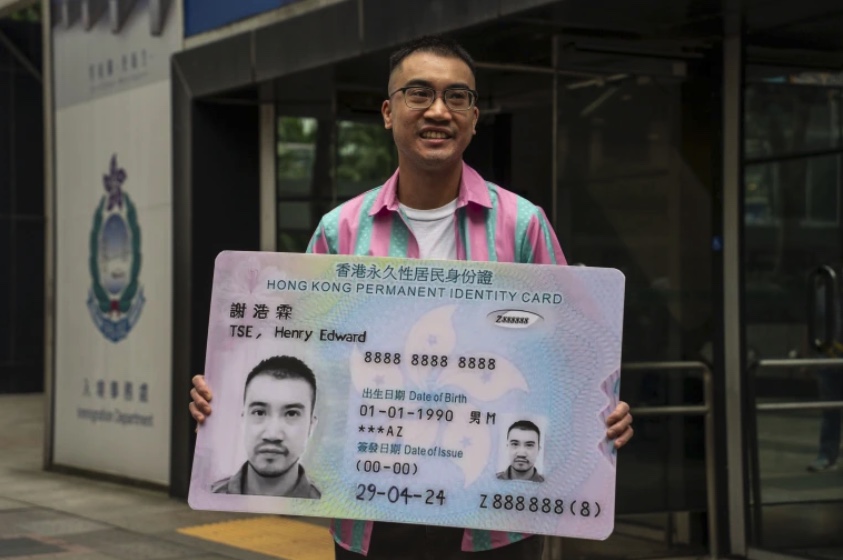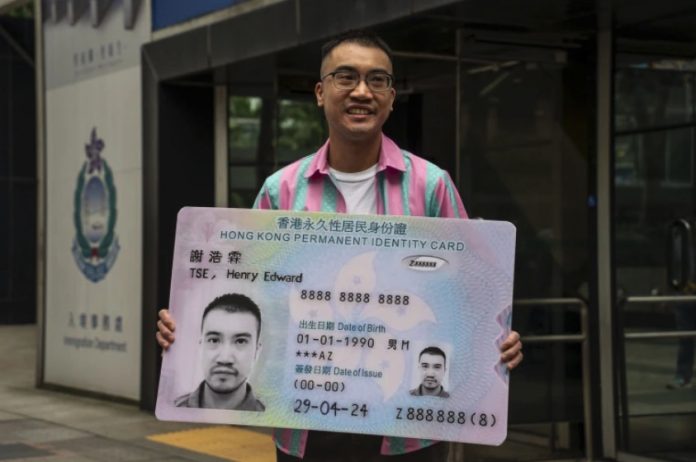สำหรับ Henry Tse นักเคลื่อนไหวข้ามเพศในฮ่องกง บัตรประจำตัวของเขาเป็นจุดสนใจของการต่อสู้ทางกฎหมายนาน 7 ปีเพื่อการรับรอง ในที่สุด เมื่อวันจันทร์ เขาได้รับบัตรประจำตัวใหม่ที่ระบุเพศของเขาว่าเป็นผู้ชาย Tse แสดงความโล่งใจ โดยระบุว่าสามารถแก้ไขความท้าทายที่มีอยู่ทุกวันของการมีบัตรประจำตัวที่ไม่สอดคล้องกัน “การ์ดใบนี้ในมือของฉันมีความสำคัญอย่างยิ่งสำหรับฉันและคนอื่นๆ ในที่สุดก็สามารถรับ ID ที่อัปเดตได้” เขากล่าวกับผู้สื่อข่าว เขาแต่งกายด้วยเสื้อเชิ้ตลายทางสีชมพูและสีน้ำเงิน ซึ่งเป็นสัญลักษณ์ของธงข้ามเพศ โดยประกาศว่า “นี่เป็นวิธีแก้ปัญหาอย่างแท้จริงสำหรับความอับอายและความท้าทายในชีวิตประจำวันที่เกิดจากบัตรประจำตัวที่ไม่เข้ากัน” การต่อสู้ทางกฎหมายของ Tse สะท้อนให้เห็นถึงการต่อสู้ในวงกว้างที่นักเคลื่อนไหว LGBTQ เผชิญทั่วเอเชียตะวันออก ท่ามกลางการยอมรับของสาธารณชนที่เพิ่มมากขึ้น
เป็นเวลาหลายปีมาแล้วที่ทางการฮ่องกงกำหนดให้ต้องผ่าตัดยืนยันเพศเต็มรูปแบบเพื่อการเปลี่ยนแปลงเพศ ซึ่งเกี่ยวข้องกับการเปลี่ยนแปลงอวัยวะเพศ กลุ่มสิทธิคนข้ามเพศโต้แย้งว่าการผ่าตัดเป็นทางเลือกส่วนบุคคล และไม่ใช่ทุกคนสามารถจ่ายหรือเข้ารับการผ่าตัดได้เนื่องจากความเสี่ยงด้านสุขภาพ ในปี 2560 Tse ฟ้องรัฐบาลฮ่องกงเกี่ยวกับข้อกำหนดนี้ ศาลอุทธรณ์สุดท้ายของฮ่องกงตัดสินตามความเห็นชอบของ Tse เมื่อเดือนกุมภาพันธ์ปีที่แล้ว อย่างไรก็ตาม เจ้าหน้าที่ใช้เวลากว่าหนึ่งปีในการปรับนโยบาย ส่งผลให้ต้องรอเป็นเวลานานก่อนที่ Tse จะได้รับบัตรประจำตัวใหม่ของเขา ภายใต้กรอบการทำงานที่ปรับปรุงใหม่ ผู้สมัครที่เป็นบุคคลข้ามเพศจากหญิงเป็นชายจำเป็นต้องได้รับการผ่าตัดขั้นสูงเท่านั้น
ในช่วงที่รัฐบาลล่าช้า Tse ต้องเผชิญกับความท้าทาย เกือบพลาดเที่ยวบินเนื่องจากบัตรประจำตัวเก่าของเขา และประสบปัญหาที่ชายแดนจีน ต่อมาเขาได้ยื่นฟ้องอีกคดีหนึ่ง ในฮ่องกง นักเคลื่อนไหว LGBTQ ยังคงแสวงหาการยอมรับและความเท่าเทียมผ่านการต่อสู้ทางกฎหมาย แม้จะชนะมาแล้วหลายครั้งก็ตาม สิ่งนี้แตกต่างอย่างมากกับจีนแผ่นดินใหญ่ ซึ่งสิทธิของ LGBTQ เผชิญกับการตรวจสอบที่เพิ่มมากขึ้นภายใต้การนำของ Xi Jinping เมื่อเดือนกันยายนปีที่แล้ว ศาลสูงสุดของฮ่องกงได้ออกคำสั่งสำคัญให้รัฐบาลกำหนดกรอบการทำงานสำหรับการยอมรับสิทธิของคู่รักเพศเดียวกัน อย่างไรก็ตาม ยังไม่มีการประกาศแผนการดำเนินการที่เป็นรูปธรรม ไต้หวันออกกฎหมายให้การแต่งงานของคนเพศเดียวกันในปี 2019 และศาลของญี่ปุ่นก็มีความก้าวหน้าในด้านสิทธิ LGBTQ เช่นกัน ในขณะที่การต่อสู้เพื่อความเท่าเทียมของ Tse ได้สิ้นสุดลงแล้ว ซึ่งถือเป็นชัยชนะส่วนตัว
Following a prolonged legal struggle, a transgender activist in Hong Kong successfully secures a new identification card reflecting his male gender.

For Hong Kong transgender activist Henry Tse, his ID card was the focus of a seven-year legal battle for recognition. Finally, on Monday, he obtained a new ID marking his gender as male. Tse expressed relief, stating it resolves the daily challenges of having an incongruent identity card. “This card in my hand carries immense significance for me and others finally able to obtain updated IDs,” he told reporters. Dressed in a pink-and-blue-striped shirt, symbolising the transgender flag, he declared, “It’s a genuine solution to the embarrassment and daily challenges posed by an incongruous identity card.” Tse’s legal battle reflects wider struggles LGBTQ activists face across East Asia amid growing public acceptance.
For years, Hong Kong authorities required full gender confirmation surgery for a gender change, involving genital alteration. Transgender rights groups argue surgery is a personal choice and not all can afford it or undergo it due to health risks. In 2017, Tse sued the Hong Kong government over this requirement. Hong Kong’s Court of Final Appeal ruled in Tse’s favour last February. However, authorities took over a year to adjust their policy, resulting in a prolonged wait before Tse could obtain his new ID card. Under the revised framework, female-to-male transgender applicants need only undergo top surgery.
During the government’s delay, Tse faced challenges, nearly missing a flight due to his old ID and encountering issues at the Chinese border. He subsequently filed another lawsuit. In Hong Kong, LGBTQ activists continue to pursue recognition and equality through legal battles, despite several victories. This contrasts sharply with mainland China, where LGBTQ rights face increasing scrutiny under Xi Jinping’s leadership. Last September, Hong Kong’s top court issued a significant ruling instructing the government to establish a framework for recognizing same-sex couples’ rights. However, concrete plans for implementation are yet to be announced. Taiwan legalized same-sex marriage in 2019, and Japan’s courts have also made strides in LGBTQ rights, while Tse’s fight for equality has concluded, marking a personal victory.
By CNN NEWS

















